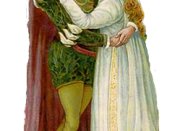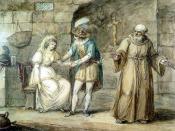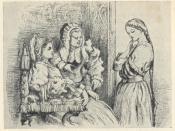Shakespeare was born in Stratford-upon-Avon, Warwickshire, in 1564. Shakespeare wrote 37 plays and combined several more. Many of his plays were successful like Twelfth Night or Will You, Julius Caesar, Macbeth and Romeo and Juliet. Romeo and Juliet is a play based on a long feud between the Montague's and the Capulet's 0.which causes confusion in Verona and tragic outcome for Romeo and Juliet. From deaths to banishment Romeo and Juliet go on loving each other until eternity. Romeo and Juliet begins as a comedy but eventually end as a tragedy. In this essay I will be analyzing how Shakespeare shows the consequences of impulsive behavior of Romeo.
Although Romeo is reluctant, believing it is irresponsible and dangerous to go with Benvolio to the ball he still does. This indicates that Romeo being sixteen and young proves he is immature and cannot make decisions properly. He relays a dream he had that he considers to be inspired, which discovers that "night's revels" will lead to terrible "consequence," meaning it will foreshadow Romeo's death as he does not know what's going to come, even to his "untimely death". Therefore when he allows himself to gate crash the ball even though he is against it, this illustrates to the audience that he is permitting himself to be dominated by his own emotions. Furthermore, Benvolio's opinion of Rosaline is evident in his metaphor, "I will make thee think thy swan a crow." Swans are elegant, beautiful birds with gleaming white feathers, they are not common as other birds. Crows are black, foul, make awful sounds, and are common. As a result, Benvolio is comparing Rosaline to crows in his metaphor. This is shown as impulsive as Romeo behaves negatively according to his emotions.
In Act 2 Scene 2, Romeo jumps into...


